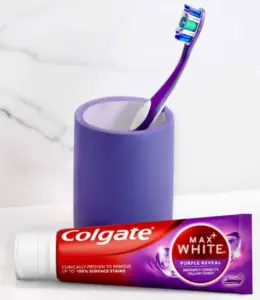- Navigating Teeth Troubles
- Introducing Purple Toothpaste: A Glimpse into Innovation
- Does Purple Toothpaste Work? Understanding the Mechanism
- The Results: What Can You Expect?
- Pros and Cons: Purple Toothpaste vs. Regular Toothpaste
- Does Colgate Purple Toothpaste Work?
- Does Purple Toothpaste Contain Bleach and Does It Whiten Teeth?
Navigating Teeth Troubles
Maintaining a healthy smile is an essential part of our overall well-being. As anyone who has experienced teeth sensitivities, enamel erosion, or discoloration knows, oral health issues can impact not only our physical comfort but also our confidence. Enter the intriguing solution – purple toothpaste. In this article, we delve into the realm of purple toothpaste, exploring its efficacy, mechanism, results, and how it stacks up against regular toothpaste. So, let’s embark on a journey to discover whether this uniquely hued oral care product is the answer to our teeth troubles.

Introducing Purple Toothpaste: A Glimpse into Innovation
Purple toothpaste, often touted as an innovation in oral hygiene, has piqued the interest of many seeking advanced solutions for their teeth woes. Promising a multitude of benefits, from enamel fortification to teeth whitening, this vibrant oral care elixir has raised questions and curiosity among oral health enthusiasts.
Does Purple Toothpaste Work? Understanding the Mechanism
Purple toothpaste derives its unique hue from the presence of innovative ingredients that go beyond the conventional whitening agents found in regular toothpaste. A key component often found in purple toothpaste is hydroxyapatite, a naturally occurring mineral that makes up a significant portion of our tooth enamel. By incorporating hydroxyapatite, purple toothpaste aims to bolster enamel strength, making teeth more resistant to decay and sensitivities.
Additionally, purple toothpaste may contain antioxidants and natural extracts that contribute to gum health and reduce inflammation. These elements work in tandem to combat the effects of plaque and acidic foods that can erode enamel over time.
The Results: What Can You Expect?
Users of purple toothpaste often report experiencing improvements in their oral health. Regular use may lead to reduced teeth sensitivity, stronger enamel, and an overall healthier mouth. However, individual results can vary based on factors such as existing oral health conditions, dietary habits, and adherence to proper oral care routines.
Pros and Cons: Purple Toothpaste vs. Regular Toothpaste
Pros:
- Enamel Reinforcement: Purple toothpaste’s unique ingredients, like hydroxyapatite, can aid in strengthening enamel, providing a layer of defense against cavities and sensitivities.
- Teeth Whitening: Some purple toothpaste formulations may contain gentle whitening agents, contributing to a brighter smile over time.
- Gum Health: Antioxidants and natural extracts in purple toothpaste can promote gum health by reducing inflammation and fighting bacteria.
Cons:
- Availability and Price: Purple toothpaste might be less widely available compared to regular toothpaste and could come with a higher price tag.
- Limited Varieties: The variety of flavors and options for purple toothpaste may be more limited compared to traditional toothpaste.
- Individual Sensitivities: As with any oral care product, some individuals might experience sensitivities or allergic reactions to specific ingredients.
Does Purple Toothpaste Whiten Teeth?
While purple toothpaste can contribute to teeth whitening through its unique formulation, it’s essential to manage expectations. Unlike professional teeth whitening treatments, the whitening effect of purple toothpaste is typically gradual and subtle. If you’re seeking rapid and significant whitening results, consulting with a dental professional for alternatives might be advisable.
Does Colgate Purple Toothpaste Work?
Colgate offers a range of toothpaste products, including some with unique colors like purple. The effectiveness of toothpaste largely depends on its active ingredients and the intended purpose of the product. Toothpaste, including purple ones, generally contains fluoride, which is an essential component for strengthening teeth and preventing tooth decay.
Colgate’s purple toothpaste, like their other products, likely aims to provide basic oral hygiene benefits such as cleaning teeth, removing plaque, and maintaining gum health. If the purple toothpaste contains fluoride and carries the American Dental Association (ADA) seal of approval, it should be effective in promoting good oral hygiene. However, if you’re looking for specific whitening properties, you might want to consider a toothpaste specifically formulated for teeth whitening.
Does Purple Toothpaste Contain Bleach and Does It Whiten Teeth?
Purple toothpaste, like any other toothpaste, does not typically contain bleach. Bleaching agents like hydrogen peroxide or carbamide peroxide are commonly found in teeth whitening products, such as whitening gels, strips, and professional treatments. Toothpaste, regardless of color, is designed primarily for cleaning and maintaining oral health, not for bleaching teeth.
In conclusion, purple toothpaste brings innovation to the realm of oral care, offering potential benefits like enamel strengthening and teeth whitening. By understanding its mechanism, results, and pros and cons, you can make an informed decision about whether purple toothpaste is the right addition to your oral hygiene routine. Remember, consulting with a dentist can provide personalized guidance based on your unique oral health needs.
References:
https://www.ada.org/resources/research/science-and-research-institute/oral-health-topics/whitening
